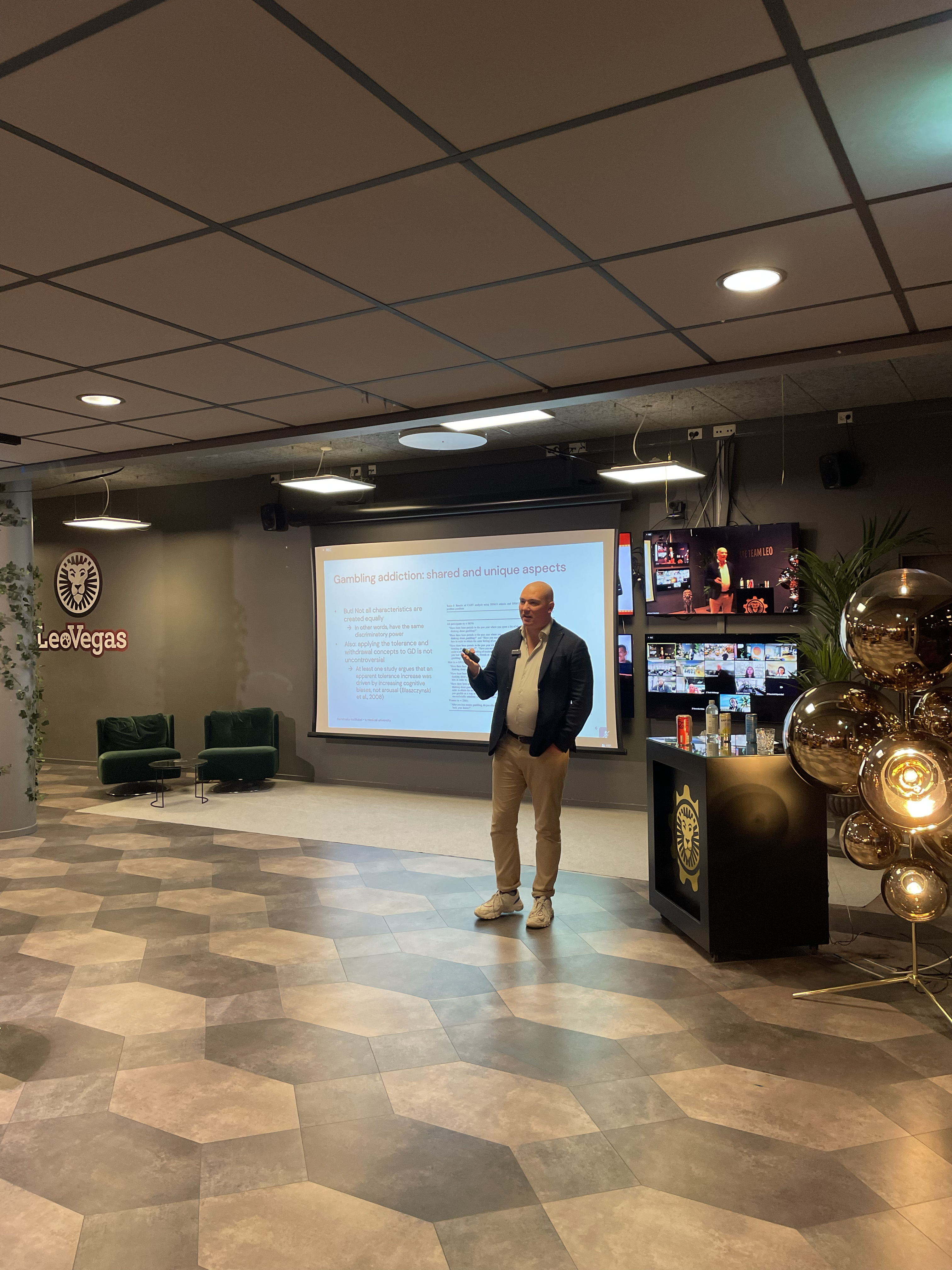Philip Lindner, Associate Professor at Karolinska Institutet and the leader of our joint research project, recently delved into the topics of addiction, predicting unsafe gambling habits, and efficient in-game interventions. As Philip shared his expertise with employees across our offices, we took the opportunity to sit down with him and discuss the latest insights in clinical psychology, addiction, and responsible gambling tools.

Photo: Karolinska Institutet
Thank you, Philip, for taking the time to present the latest insights to all of our employees! As an associate professor in clinical psychology and the Head of the Digital Psychiatry Lab at the Karolinska Institute Centre for Psychiatry Research, you’re leading our joint four-year research project. What was it that attracted you to psychology and this specific research field?
“I guess I’ve always been very interested in not just technology per se, but also how we use it. As a student, I initially planned to get into human-computer interaction rather than clinical psychology, and now I have circled back to HCI in the broad sense of the word, albeit with a clinical angle. My scientific interest in problem gambling originally came from the fact that it provides a unique window into the mechanisms of addiction, since every behavior and reinforcement along the progression from recreational to problematic can be logged, and thereby, in theory, be prevented. The closeness to real-world implementation and policymaking also makes it a very rewarding field to work in – I can’t think of any other way of helping people at this scale as a psychologist.”
What can you tell us about the project, and why is this topic so important?
“In short, we have undertaken to collaborate on five studies – each addressing key gaps in the responsible gambling literature, and each with obvious policy implications. One study, which I am particularly interested in, will use the COVID pandemic and a resulting policy change in Sweden as a type of natural experiment and look at whether mandatory limit setting is effective in a market like Sweden, where gamblers can easily circumvent this limit by gambling with different providers. There is a constant need in regulated markets to balance customer protection measures with estimates of how this would impact channelization and the duty of care. Unfortunately, this balancing act requires empirical information that legislators and other decision-makers often lack. Industry-academia collaborations like ours are – in today’s landscape – the only way of achieving evidence-based policies.”
In your view, how has the igaming industry changed concerning responsible gaming and associated tools?
“I believe that I am seeing signs of increasing recognition that gambling operators can take a more active role in preventing problem gambling on both a customer- and macro level, the latter involving proactively identifying and addressing issues that would otherwise require new policies. For example, we now have evidence from two Nordic countries that targeted customer outreach appears to have an effect in preventing continued problem gambling. Some operators have also begun to proactively introduce the concept of affordability into their responsible gambling operations. A lot of this involves, by necessity, some trial and error, which is why I am glad to see more and more industry-academia collaborations to ensure transparency and objectivity.”
What are some gambling addiction myths or misconceptions you can break down for us?
“A common misconception whenever addiction of any sort comes up, is that sufferers need to “reach rock bottom” before they really “want to change” and thereby become susceptible to any help. Notwithstanding the big issue in how to define “rock-bottom” for each individual, it is certainly true that especially adverse events can trigger windows of increased motivation that can facilitate help-seeking and behavior change, at least short-term. However, it is nonetheless always advisable to take action at the first signs of addiction. There is even an entire field, covering both theory and practice, dedicated to how to explore and amplify an individual’s inherent motivation for change, regardless of what stage of change they are at. Indeed, a lot of research these days is on the topic of increasing the window of how early signs of problem gambling can be detected, to be able to intervene at an earlier stage and avoid all the cumulative suffering associated with developing addiction.”
Are there necessary steps that all operators, suppliers, and game developers need to collectively take in order to improve responsible gaming?
“There is of course a lot to be said here, but one succinct take-home-message that cannot be repeated often enough is that in the case of gambling, the traditional rules of creating a “good user experience” do not apply: just because you can introduce a certain feature, that does not mean that you should – even if it turns out to be popular. If you truly want to promote sustainable, non-harmful gambling, then the distinction between short and long-term effects must be recognized in every decision.”
How do you foresee that responsible gaming tools and gambling addiction research will advance?
“Historically, the discussion on responsible gambling has, for good reasons, been focused on preventing problem gambling. But this also entails that the opposite side of the coin has been somewhat neglected, i.e. how to promote safe and sustainable gambling habits. I am glad to see signs that the field now appears to be expanding to also cover this side. For example, I recently came across a research paper that showed the potential of using customer loyalty programs to promote responsible gambling, which I found very refreshing. Perhaps there are indeed ways to incentivize, in a safe way, taking self-tests and reflecting on individualized feedback from behavioral tracking? A lot of responsible gambling researchers would argue that having gambling customers remain with and stay loyal to one specific operator would be preferable from a public health perspective, since churn in practice dilutes the potential to exercise duty of care, assuming of course that the customer moves to another operator rather than quitting gambling altogether.”

